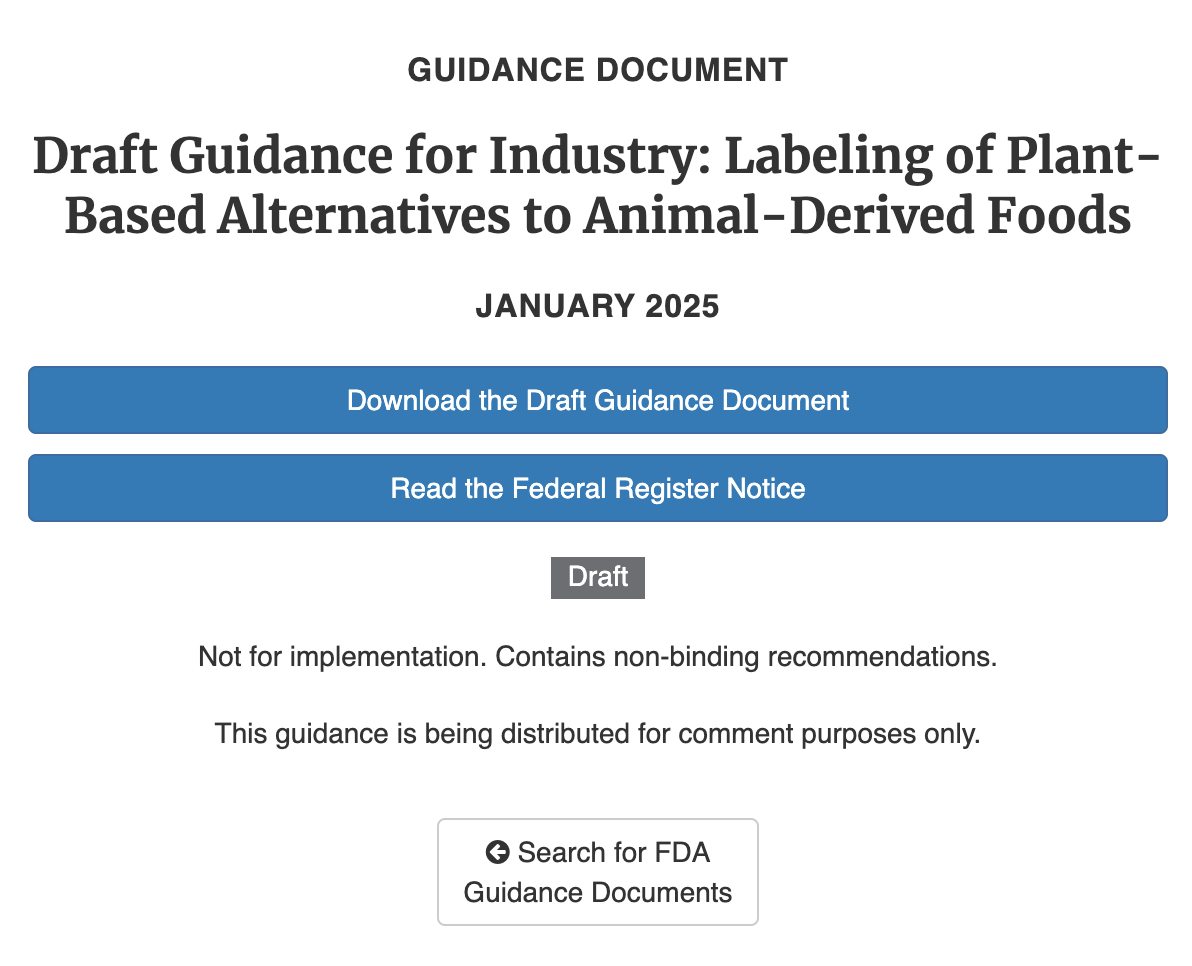Comment on FDA Draft Guidance “Labeling of Plant-Based Alternatives to Animal-Derived Foods” (Docket No. FDA-2022-D-1102)
I am writing to express strong concern regarding the FDA’s Draft Guidance on the labeling of plant-based alternatives to animal-derived foods, published January 2025. Specifically, the guidance’s recommendation to require manufacturers to list the “primary plant ingredients” of animal-free products in the statement of identity—e.g., changing a “veggie burger” to a “wheat, pea, and soy plant-based burger”—represents a fundamental departure from decades of regulatory practice and risks undermining consumer understanding, public health, and fair market competition.
1. Discriminatory Burden on Animal-Free Food Producers
The FDA’s guidance singles out producers of animal-free foods by imposing burdensome naming recommendations that are not similarly applied to other food categories. While animal-derived products routinely use simplified or standardized names (e.g., “hot dog,” “chicken nugget”) without requiring their full ingredient composition on the principal display panel, the guidance recommends that animal-free products list all “primary plant sources” as part of the product name (p. 10). This is not a requirement imposed on multi-ingredient animal products and unfairly discriminates against a fast-growing sector of the food industry.
2. Contrary to Established Labeling Norms
The FDA itself acknowledges that plant-based alternative foods are "non-standardized foods" that are subject to the same general requirements as other non-standardized foods (p. 6-7). There is no precedent or regulatory requirement under 21 U.S.C. § 343(i)(1) that non-standardized foods must include every primary ingredient in their product name. The draft guidance deviates from this standard and would result in inconsistent and overly complicated food labeling.
3. Decreases Consumer Understanding
Rather than enhancing consumer clarity, the proposed naming format risks creating confusion. A product labeled “pea, soy, and wheat burger” is less recognizable and intuitive than “veggie burger” or “plant-based burger,” particularly when consumers are accustomed to naming conventions based on flavor and usage rather than ingredient source. The FDA itself notes that “[plant-based] products are intended to resemble the flavor, form, or cut (e.g., burger or fillet), texture, and appearance of foods derived from animals” (p. 5). The proposed guidance undermines this familiar framing, making products less accessible and increasing the cognitive burden on consumers.
4. Misrepresents Allergen Transparency
Recommending that primary plant sources be included in the product name implies an allergen disclosure function. Yet the most reliable method for allergen information remains the ingredient list and the federally mandated allergen labeling requirements under the Food Allergen Labeling and Consumer Protection Act (FALCPA). Highlighting only some ingredients on the front of the package may give a false sense of security—or unnecessarily alarm consumers—while doing little to enhance actual allergen safety.
5. Hinders Public Health and Dietary Diversity
FDA’s own nutrition initiatives and the U.S. Dietary Guidelines emphasize the need for greater dietary diversity and reduced consumption of saturated fat and cholesterol—goals aligned with increased consumption of animal-free foods. Yet the proposed guidance risks deterring consumers from selecting these products by obscuring what they are and implying unfamiliarity or inferiority. In effect, this labeling change would suppress a product category that is central to public health efforts, including those to reduce chronic diseases associated with animal product consumption.
6. Market Interference Favoring Animal Agriculture
While the guidance is non-binding, its implementation would distort the marketplace by advantaging animal-derived products and impeding the growth of animal-free alternatives. The stated rationale of “help[ing] consumers distinguish one class or subclass [of plant-based foods] from another” (p. 8) is undermined by the disproportionate impact this guidance would have on animal-free products alone. It functions more as a market deterrent than a consumer safeguard.
In conclusion, I respectfully urge the FDA to revise the draft guidance to preserve the use of clear, concise, and familiar names like “veggie burger,” “plant-based sausage,” or “animal-free chicken nuggets” without requiring a list of primary plant sources in the product name. Ingredient information can and should remain where it has always been: in the ingredient list and Nutrition Facts panel.
Thank you for your consideration.
Sincerely,
Crystal Heath, DVM

